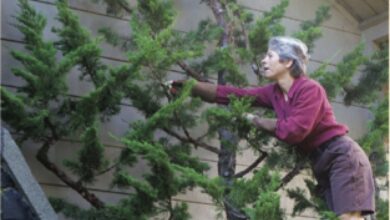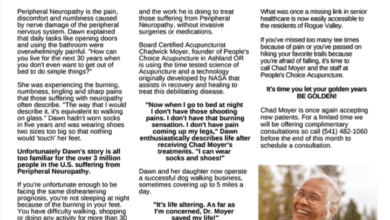Dr. Stephen Tesluk – Ashland Veterinary Hospital
Right now it’s all hands on deck with emergency personnel and service workers and we as a community are beyond grateful. This also includes veterinarians who are going above and beyond to take care of our pets and animals in this time of crisis. In today’s interview, I speak with Dr. Steven Tesluk about his work at Ashland Veterinary Hospital and how he is working to support the community during this time of crisis.
Dr. Tesluk, thanks so much for speaking with us today. How is everyone holding up and what’s the update from AVH?
Thanks for the opportunity. Everyone at Ashland Veterinary Hospital has been doing well, focusing on continuing to care for our patients in need, while doing our best to keep our clients as well as every member of our staff healthy.
Are you guys currently running routine services or are you only focused on the essential right now?
We are currently holding office hours on Monday, Tuesday, Thursday and Friday between 8:30am and 2pm. We are open on Wednesday from 8:30am to 12pm for food and medicine purchases. We are seeing patients who are ill or hurt, require follow up visits for previously diagnosed problems, require vaccinations, surgery or dental procedures. The only thing we are not seeing pets for is elective surgeries that use up personal protective equipment as per orders from the state of Oregon.
What measures are you and your staff taking to protect themselves and your customers?
Since the third week of March, we have had social distancing protocols in place at our clinic. We are seeing patients by appointment only, no walk up appointments are available. We are asking owners if they have been ill when they call for the appointment. When the owner arrives for their appointment, a gloved and masked staff member will meet them in the parking lot to take their pet and bring them into the clinic. The owner will wait outside until the exam is completed and I will communicate with the owner by cell phone and give them my recommendations. Once the appointment is finished and the owner and I agree on a plan, a gloved and masked staff member will return the patient to the owner in the parking lot, along with any medications that are prescribed. All of our staff are wearing masks the entire time they are at the clinic, and we are doing a lot of hand washing and sanitizing.
What are you seeing in terms of treatment cases with your animal patients?
The types of cases we are seeing currently are pretty much what we usually see. Rabies and other vaccinations, cat abscess, trauma, gastro-intestinal issues, allergic skin diseases, chronic illness, geriatric cases, and other internal medicine problems make up most of our caseload. As we get into the warmer weather, we expect there will be more cases of issues associated with outdoor activity. As I mentioned earlier, we have been constrained by the state government from doing any elective surgical procedures that use up personal protective equipment for the time being.
What are your biggest concerns with the current crisis as we move forward into the future in terms of pets and animals?
My chief concern for pets during this pandemic is that owners might put off preventative care or dealing with an injury or illness because of financial concerns or worry about COVID-19. All the things we do to keep pets healthy and safe are still important despite restrictions put in place by the government. There are sporadic reports coming across the news about pets acting as carriers for COVID-19. I would like to reassure owners that although there have been a few cases of dogs and cats testing weakly positive for COVID-19, there has been no evidence that shows pet’s can transmit COVID-19 to humans. Felines and ferrets may develop clinical signs of a COVID-19 infection in rare cases.
Can you offer some DIY solutions for people working with their pets and animals at home right now?
DIY solutions for ill or injured pets are not something I would recommend. Our furry family members are not mechanical devices that can be tinkered with. First aid measures such as wound care or nursing care with consultation from a veterinarian are ok as a temporary measure until a client can get an appointment, but a client should never wait on a serious health issue while figuring out if they need to see a vet.
Delay could result in a small problem becoming a big problem. Emergency service is still available at the Southern Oregon Veterinary Specialty Clinic in Medford (541) 282-7711.
Dr. Tesulk, can you please tell us a little bit more about yourself and your work here in Ashland?
I graduated from The UC Davis School of Veterinary Medicine in 1998, and worked in the Los Angeles area of California for a couple of years before moving to Ashland with my wife Susan and two small children in 2000. I ended up taking a job as an associate veterinarian at Ashland Veterinary Hospital in 2001, and I purchased the practice in 2005. I have a special interest in internal medicine and behavior issues, and we are the only practice that offers a Companion Litecure class IV therapeutic laser system for the treatment of inflammation and pain in the Rogue Valley. We are lucky to have a very experienced staff who are devoted to caring for our clients pets. Susan and I are music aficionados and we enjoy getting out into nature as often as possible.
Would you mind giving us a quick overview of the services available and currently available at your clinic?
Ashland Veterinary Hospital offers medical and surgical treatments, dental cleaning and extractions, class IV laser therapy, behavior consultations, boarding (not currently due to social distancing) and limited grooming.
What are the best advice or tips you can offer at this time for pet owners?
My advice to pet owners at this challenging time is the old adage, “an ounce of prevention is worth a pound of cure.” Owners should strive to keep up with preventative care for their pets, including vaccinations and heartworm prevention. They should avoid risky activities with their pets – don’t let dogs run off leash, keep cats in at night, keep their environment safe from toxins and other dangerous materials, and don’t ignore signs that they are not well (like appetite loss, vomiting, diarrhea, increased water consumption or urination, lethargy, limping, etc) in trying to avoid a visit to the veterinarian. If you have questions about your pets well being, you should always call your veterinarian first – that’s why we are here.
Finally, are there any last thoughts or comments you would like to share?
Finally, everyone at Ashland Veterinary Hospital is hoping that everyone out there takes this pandemic seriously and follows our health experts advice on social distancing. COVID-19 is a killer, and because asymptomatic carriers are common, the risk of contracting it will be with us for some time. Remember we are in this together. The staff at Ashland Veterinary Hospital will continue to be here when your furry family members need us.
Thanks for going above and beyond to help the animals of our community.
Thanks Shields for this opportunity.




